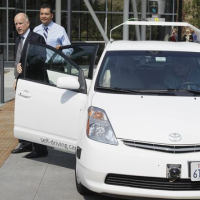If a Driverless Car Gets a Ticket, Who Pays?
 Governor Jerry Brown checks out Google's driverless car (photo: Eric Risberg, Associated Press)
Governor Jerry Brown checks out Google's driverless car (photo: Eric Risberg, Associated Press)
The age of robot-driven cars is here, thanks to Google. These self-driving vehicles have logged thousands of miles on California’s Bay Area roadways, ushering their human passengers (a person is always in the driver’s seat, per the law) to their destinations.
So far, Google’s autonomous cars have a perfect law-abiding record: Not one of them has been issued a traffic citation…yet.
But it seems like just a matter of time, or robotic hiccup, before one of the vehicles does something to get pulled over and issued a ticket.
When that day comes, who’s going to pay the fine? Google? The person behind the wheel, who has no control over the car?
Which leads to the question of whether a vehicle “operator,” as referenced in the legal code, may be either a human being or a corporation (which brings to mind a certain U.S. Supreme Court ruling that infamously equated corporations with people).
“A person, if it is defined as a human person and not a corporation, that's what we're really wondering about,” Ron Medford, safety director for Google's self-driving car program, and a former deputy administrator of the National Highway Traffic Safety Administration, said at a recent meeting of California’s Department of Motor Vehicles (DMV). “Even in this definition . . . does a person mean a human individual or can it mean something more?”
The response from DMV assistant chief counsel Brian Soublet: “Well, right, if you look at the common definitions that are in the vehicle code, a person includes a corporation and a partnership and other forms of entities. So when we think of a vehicle being operated, is it that inclusive? Is the operator that person, that could be a corporation?”
“Perhaps the ticket should go to the programmer who wrote the algorithm that made the mistake?” The Atlantic’s Alexis Madrigal supposed, tongue in cheek.
Sergeant Saul Jaeger, press information officer at the Mountain View Police Department, told Madrigal in an email: “Right now the California Vehicle Code reads that the person seated in the driver’s seat is responsible for the movement of the vehicle.”
But that doesn’t really answer the question in the case of self-driving cars.
As far as Google is concerned, it will pay for any tickets stemming from its special cars running afoul with the law.
“What we’ve been saying to the folks in the DMV, even in public session, for unmanned vehicles, we think the ticket should go to the company. Because the decisions are not being made by the individual,” Medford told The Atlantic.
The California Legislature addressed the matter in Senate Bill 1298, which requires the state DMV to adopt regulations for the testing and use of autonomous vehicles on public roads. It adopted said rules on May 20. They will go into effect on September 16, 2014.
–Noel Brinkerhoff and Danny Biederman
To Learn More:
Google's Self-Driving Cars Have Never Gotten a Ticket (by Alexis Madrigal, The Atlantic)
California Approves Test of Self-Driving Cars on Public Roads (by Megan Geuss, Ars Technica)
How Does a Traffic Cop Ticket a Driverless Car? (by Bryant Walker Smith, New Scientist)
- Top Stories
- Controversies
- Where is the Money Going?
- California and the Nation
- Appointments and Resignations
- Unusual News
- Latest News
- California Forbids U.S. Immigration Agents from Pretending to be Police
- California Lawmakers Urged to Strip “Self-Dealing” Tax Board of Its Duties
- Big Oil’s Grip on California
- Santa Cruz Police See Homeland Security Betrayal in Use of Gang Roundup as Cover for Immigration Raid
- Oil Companies Face Deadline to Stop Polluting California Groundwater





